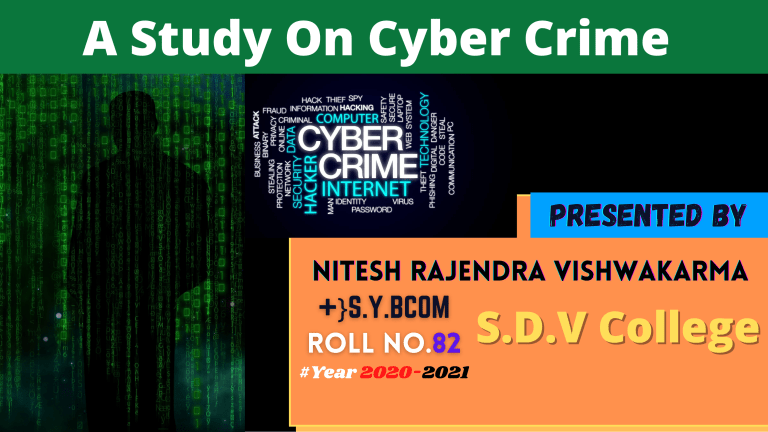
A Study On Cyber Crime Presented By Nitesh Rajendra Vishwakarma S.D.V College #Year 2020-2021 + Introduction + Definition + History + Type's OF Cyber Crime + Advantage / Disadvantage + Prevention Conclusion INTRODUCTION Cybercrime is any criminal activity that involves a computer, networked device or a network. A primary effect of cybercrime is financial. Cybercrime can include many different types of profit-driven criminal activity, including ransomware attacks, email and internet fraud, and identity fraud, as well as attempts to steal financial account, credit card or other payment card information. Cybercriminals may target an individual's private information or corporate data for theft and resale. As many workers settle into remote work routines due to the pandemic, cybercrimes are expected to grow in frequency in 2021, making it especially important to protect backup data. DEFINITION_ 1. crimes in which the computing device is the target -- for example, to gain network access; 2. crimes in which the computer is used as a weapon -- for example, to launch a denial-ofservice (DoS) attack; and 3. crimes in which the computer is used as an accessory to a crime -- for example, using a computer to store illegally obtained data. HISTORY''' The first recorded cyber crime took place in the year 1820! That is not surprising considering the fact that the abacus, which is thought to be the earliest form of a computer, has been around since 3500 B.C. in India, Japan and China. The era of modern computers, however, began with the analytical engine of Charles Babbage. TYPE's OF CYBER CRIME Financial crimes This would include cheating, credit card frauds, money laundering etc. To cite a recent case, a website offered to sell Alphonso mangoes at a throwaway price. Distrusting such a transaction, very few people responded to or supplied the website with their credit card numbers. These people were Cyberextortion Cryptojacking Identity theft Credit card fraud Cyber stalking REAL TIME CYBER CRIME 1. Social Network Fraud It is also a crime to create fake profiles or to send fake messages to other users on social media. If a user of social media creates a fake profile to impersonate another person, without the other person’s consent, that action could be criminal. But a crime has only truly been committed if the fake user has the purpose of causing harm, committing fraud, or intimidating or threatening someone with the fake profile or fake messages. It remains to be seen if merely “catfishing” someone rises to the level of a crime under this statute. 2. Cyberbullying Cyberbullying occurs when people use social media or the internet to intimidate, harass, threaten or belittle others. In Texas, cyber bullying is covered by several statutes. Some laws apply only to students, while others are applicable to everyone. In general, if a person or student uses the internet or any other form of electronic communication to threaten, harass or scare another person or student, this conduct may be a crime. Furthermore, such actions carry the possibility of civil liability as well. ADVANTAGE 1. Improved security from cyberspace to the real world. The security of the world from rapists, pedophiles and other kind of criminals are significantly reduced during the years due to the fact that everything can be found as long as is online. 2. Increase in cyber-defense cyber-defense.. Every cybercrime is created by finding a new loophole, this makes the people who work on the defensive systems to improve and evolve their systems constantly. DISADVANTAGE 1. Improved hacker speed and ability. Due to the fact that the web is getting faster and faster and evolves every day and increasing its speed, it allows the hackers to do more effectively some kinds of crimes that require speed and skills. For example robbing money from an account. Some Other activity going on like hacker now a time finacial attack's doing .Also now a days people on social media abuse each other with fake account and threats. PREVENTION 1) Keep Your Computer and Other Devices Updated — 2) Practice Good Password Management — 3) Use Anti-virus and Anti-malware Software to Protect Your Devices — 4) Prevent Unauthorized Access to Your Devices — 5) Secure Your Home Network — 6) Educate Household Members on Personal Cybersecurity Practices — 7) Maintain Regular Backups of all Important Data — 8) Protect Your Sensitive Personal Information — 9) Don’t Fall Victim to Phishing and Other Scams — 10) Have a Plan in Place in Case You Become a Victim of Identity Theft — CONCLUSION' Cybercriminals are focusing on individuals and small businesses more now than ever. They look for easy prey and are constantly taking advantage of obvious vulnerabilities. Cybercriminals value your private and sensitive data and will find creative ways to get it. So what can you do about it? Without the resources of large corporations, small businesses must be doing the obvious things that can protect themselves from cybercrimes. You, as an individual target, must practice good cybersecurity and know the 10 ways to protect yourself from cybercrimes. k n k a n h a T h T ! u ! o u y o y


